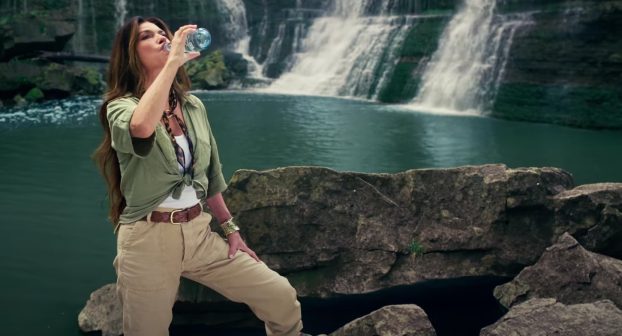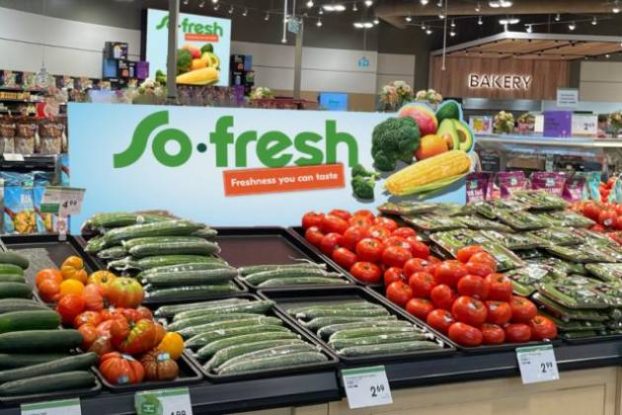My running buddy Sandy Van told me about a furniture-for-sale message posted on her lobby bulletin board – it gave a telephone number and a request that people not call during the airing of ‘it.’
Another friend boasted about consuming pirated tapes of all 13 season-two episodes of ‘it’ in one weekend, which must be like single-handedly downing 13 large pizzas in one sitting.
A few weeks ago I was browsing at HMV and came across a DVD containing a complete set of the first season episodes of ‘it’ for $113, or you could rent the episodes – three per tape – for the same price as Gladiator.
There’s a coffee-table book about ‘it.’ You can order a T-shirt or coffee mug sporting ‘its’ logo.
The ‘it’ is The Sopranos and, as its third season of stories kicked off last month, a new wave of interest erupted. But there’s a catch to being captivated, of course. Here in Canada, you have to subscribe to The Movie Network (TMN) in order to watch The Sopranos.
Here we have a case of a single program so powerful it is single-handedly poised to build a network’s subscriber base, revenue and brand awareness.
As traditional TV networks twist over backwards to find an ideal scheduling formula for Friends and Survivor II, The Sopranos plays hard to get. It has a sporadic schedule. You’re never sure there will be another year. It’s rarely available free of charge. You have to watch it in its correct chronology or you’re lost. It has an incredibly complex web of characters to keep straight. But people love it.
CTV provided the proof of that fact when, in an absolutely brilliant counter programming move, it ran The Sopranos opposite last year’s Olympic coverage on CBC. Between 10 p.m. and 11 p.m., Sunday to Friday for two weeks this past fall, The Sopranos generated national rating levels between 7 and 10, whereas CBC’s Olympics came in at half those levels.
You know you have a big-time media deal happening when consumers get upset about a TV program – and there are lots of people upset about The Sopranos. The Italian-Canadian community is not happy with the depictions. There are letters to newspaper editors expressing concern with the language, violence and glorification of illegality.
A few weeks ago, Doug Newell, my partner here at work who knows more about TV than most people, asked me why I thought The Sopranos was so good. Here’s what I’ve concluded.
The Sopranos isn’t really a TV program – it has media characteristics that are much more in common with a book – it’s a kind of video-book.
Like a book, you pay to experience The Sopranos. Like a book, the writing is everything. The characters are lovingly fashioned in a book-like way. And no wonder. The Sopranos springs from the mind of David Chase who is, first and foremost, a writer. He is Italian-American, raised in New Jersey on a diet of hard-boiled gangster movies. His schooling includes filmmaking at the School of Visual Arts in New York in combination with study in the graduate film program at Sanford University. He went on to produce/write The Rockford Files and Northern Exposure (two of my all-time favorite shows).
And when you think about it, you realize that The Sopranos really isn’t like anything we’ve ever seen on TV before. It’s not like a soap opera because there is much more depth of character. It’s not like a TV series because there is a strict chronology built into the episodic format. It’s not like Roots or The Thorn Birds or Shogun because the episodes span months of airings. The Sopranos captures a viewer profile that is 50/50 male/female with above average personal income…very un-TV like. And unlike most TV, The Sopranos extracts a price from the viewer.
Also, I find The Sopranos is broken up into chapters rather than episodes. Chapters are a throwback to the time when stories were told rather than read. Epics were broken up into digestible mini-stories because it gave everyone a chance to have a washroom break.
And, if the story was really good, the chapter break gave the audience an opportunity to catch their breath.
And so beyond the great production values, story line and the colourful characters, it is the writing and book/chapter structure that makes The Sopranos so compelling.
Perhaps there’s a lesson here for TV buyers. Should they buy commercial time in that new TV series? Does the series feel like a book? Did you have to catch your breath at the end of each chapter? Would you pay to hear the story?
Yes? Then buy it. It’s a sure sign of big ratings to come.
Rob Young is a founding partner and SVP, planning and research, at Toronto-based Harrison, Young, Pesonen & Newell. Send comments to ryoung@hypn.com.























